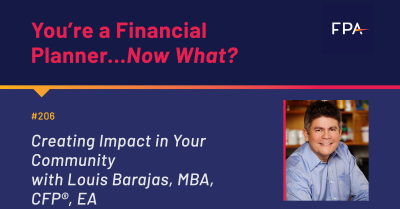
Louis Barajas, CFP®, has over 30 years of experience in the profession. He’s also an author of multiple books, a business and wealth manager, and a national speaker. Of course, he has lots of fantastic stories and wisdom to share about his history in financial planning.
In our newest episode of YAFPNW, Alexandria and Louis discuss his upbringing, meeting people where they are, and how he changed the community he grew up in.
An early start to the profession
How was Louis introduced to the profession? At 11 years old, Louis’s father started his own business. As the oldest child and because he spoke English, Louis got a business license for his dad. At 13, he helped him file his first tax return. Louis then pledged to learn everything he could about personal finances so that he could help his family. He attended UCLA, got his MBA, and began work at a firm in Newport Beach California.
Louis remembers the exact day, time, and location that changed his life, when he met and spoke to Rick Warren, pastor and author of The Purpose Driven Life.
“The gentleman that I met on September 8, 1990 at seven o'clock in the morning in Lake Forest, California...he said things to me that literally just changed my life,” said Louis. “I quit, went back to the barrio...I ended up working there for 15 years in the barrio, giving back to our community.”
Since then, Louis has written six books, runs a business management firm for Latin celebrities, and handles $250 million for clients through his investment firm. On top of it all, he’s a national speaker and does pro bono work throughout the country. But when you have a conversation with him, you can tell that helping people in his community is one of his biggest passions.
Financial significance over financial sense
People often associate financial planning with investing, Wall Street, the market, things like that, as Alexandria explains in the episode. But look at the titles of Louis’s books alone, and you remember that the average American has a different day-to-day relationship with money. Small Business, Big Life. Overworked, Overwhelmed, & Underpaid. Where did Louis find the inspiration for these books, and similarly, his approach to helping clients in his community?
It came from the clientele base itself, Louis says. There was not a lot of financial literacy where he grew up. Sometimes even cultural beliefs were misguiding people on their finances, too. That’s why Louis had to create a different strategy by teaching people financial significance, not financial sense. It was important to understand people’s needs and tweak his approach, which is easy to forget when you’ve been a financial planner for awhile.
“How do you approach them in a way that they can actually listen to what you're saying and they can understand what you're saying? Because we forget that we learn all this terminology,” said Louis. “They're intimidated by the way we speak and how we say things, as compared to talking to them in their own language.”
Helping people in need
Meeting people where they’re at, being aware of the situation goes beyond communication styles. For Louis, it also affected how he charged people for his services. The growth of his business and his struggle to hire minorities; less than 3.5% of all planners in the industry are African-American or Latinx.
However, the next generation of financial planners can continue the work towards change. We can help people in need who want to be helped. We can find pro bono work that we feel connected to and passionate about. We can educate ourselves by reading books, asking questions, in order to solve those problems that maybe don’t get as much attention as others.
“You have to be a lifetime learner. You have to educate yourself,” said Louis. “There aren't going to be classes for if you're going to be helping the middle-class or the lower middle class. You have to try to be a problem solver.
What You’ll Learn:
- Louis’s background and start in the profession
- The random encounter that changed his life
- Where Louis found inspiration for his books
- Why Louis prioritized giving back to his community
- The lack of minorities in the profession
- How young professionals can make a difference in their communities
- The importance of educating yourself
- Helping those who are ready to listen
Show Notes:
In this episode of YAFPNW, Alexandria Davis and Louis Barajas, CFP®, discuss:
- The six books Louis has written
- The Purpose Driven Life by Rick Warren
- Louis on YouTube
- The lack of African-American and Latino financial planners
- The Diversity Advisory Group (DAG) for the Center for Financial Planning
- New Economics for Women
Follow Louis on LinkedIn, on Facebook, and on Twitter at @louisbarajas.